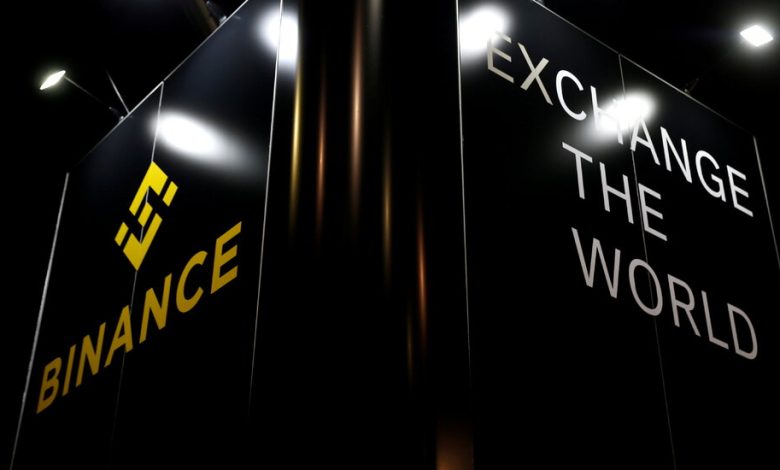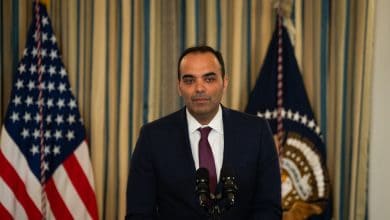In FTX Collapse, Binance Sees a Chance to Become the New Face of Crypto

In early November, just days before the cryptocurrency exchange FTX filed for bankruptcy, its founder, Sam Bankman-Fried, reached out to his archrival, Changpeng Zhao, to ask for help.
“I don’t know how things got so bad between us,” Mr. Bankman-Fried texted Mr. Zhao, according to a person with knowledge of the exchange. “I need your help for the sake of the industry and users.”
Mr. Zhao, the founder of Binance, the world’s largest cryptocurrency exchange, initially agreed to provide a loan and buy FTX to save it. But after examining FTX’s books — and seeing the extent of its financial troubles — Mr. Zhao changed his mind, and Mr. Bankman-Fried had no choice but to put his company into bankruptcy. On Monday, Mr. Bankman-Fried was arrested in the Bahamas after American prosecutors filed criminal charges against him.
Mr. Zhao’s actions were the culmination of a complicated relationship between the founders of the two biggest cryptocurrency exchanges, one that has sometimes involved the two men sparring publicly and taunting each other on Twitter. As the rapid growth of their companies turned both into paper billionaires, their competing visions of the cryptocurrency industry — and whether and how it should be regulated — held enormous sway, especially with governments around the world poised to crack down.
But while Mr. Bankman-Fried ran a highly visible campaign to court lawmakers and shape cryptocurrency regulation in the United States, while spending furiously on advertising to promote the FTX brand, Mr. Zhao and Binance kept a low profile.
Mr. Zhao, who once described regulation as a “risk” for his company, largely avoided engaging with lawmakers except in countries friendly to crypto. Still, recognizing that regulation was inevitable, Binance began taking steps in the past year to scrub its reputation as a shadowy giant with no headquarters that doesn’t always follow the rules.
Now, the collapse of FTX has provided Binance with an opening to establish its credibility with investors and regulators more publicly. Mr. Zhao, known in the crypto community as CZ, recently sent reassuring messages to his eight million followers on Twitter, pitching himself as a savior of the cryptocurrency industry.
“#bitcoin is not dead. We are still here,” he wrote on Nov. 20.
Mr. Zhao also couldn’t resist taking a dig at his rival.
“You don’t have to be a genius to know something don’t smell right at FTX,” he posted on Twitter this month. “They were ⅒th our size, yet outspent us 100/1 on marketing & “partnerships”, fancy parties in the Bahamas, trips across the globe, and mansions for all of their senior staff (and his parents).”
To dispel the view that Binance has skirted regulations, the company recently announced it had acquired a Japanese cryptocurrency exchange, allowing it to enter the Japanese market “as a regulated entity.”
The Aftermath of FTX’s Downfall
The sudden collapse of the crypto exchange has left the industry stunned.
- A Spectacular Rise and Fall: Who is Sam Bankman-Fried and how did he become the face of crypto? The Daily charted the spectacular rise and fall of the man behind FTX.
- Market Manipulation Inquiry: Federal prosecutors are said to be investigating whether Mr. Bankman-Fried manipulated the market for two cryptocurrencies, leading to their collapse.
- Congressional Testimony: The FTX founder said on Twitter that he would appear before a House committee, but he was quiet about a similar request from a Senate committee.
- Frantic Exchanges: Texts from a group chat that included crypto leaders from rival companies showed the chief executive of Binance, another crypto exchange, accusing Mr. Bankman-Fried of orchestrating trades to destabilize the industry.
In the United States, Binance has tried to boost its legitimacy by hiring a slate of American executives for Binance.US, its subsidiary based in Palo Alto, Calif. Mr. Zhao also appears to be laying the groundwork for a bigger lobbying presence: Just 10 days after FTX collapsed, Binance.US started a political action committee. And it has ramped up its marketing: A recent advertisement featured the Portuguese soccer star Cristiano Ronaldo posing in a Binance jersey.
But casting Binance as the new, responsible face of crypto will be an uphill task. Since its founding in 2017, the exchange has been dogged by allegations of wrongdoing.
Binance has been sued by customers for mishandling sensitive personal data and violating securities laws. It is also under investigation by the Department of Justice and U.S. regulators as part of a wider probe into the crypto industry’s adherence to global anti-money laundering laws, according to news reports and a person familiar with the matter. (FTX, too, is being investigated for money laundering.)
In a November 2021 interview, Mr. Zhao told The New York Times that “regulators were very happy” once Binance implemented a global “know-your-customer” policy. “No regulators asked us to do it, we did it proactively to show that we’re committed to the full regulatory compliance attitude,” he said.
Igor Pejic, a cryptocurrency analyst based in Vienna, said that “in terms of regulation around the world, they have been cutting corners.”
Mr. Zhao founded Binance after a brief career in finance, including a stint at Bloomberg, where he built trading software. He created the exchange when he was living in Shanghai.
But soon after, the Chinese government banned cryptocurrency exchanges like Binance from operating in the country, and many of the company’s employees fled. Mr. Zhao maintains an active presence on Twitter but isn’t always easy to track down, having moved between Japan, Singapore, Lithuania, Malta and Dubai.
Binance’s lack of a fixed headquarters is in keeping with the trend of remote work, said Jessica Jung, a company spokeswoman. In an emailed statement, Ms. Jung said the exchange had established a local presence in nearly a dozen jurisdictions, including in Kazakhstan and France.
Ms. Jung said Binance had also announced that it was undergoing a corporate restructuring, “the aim of which is to provide regulators with further clarity about our organization.” But promises made a year ago to name a headquarters and assemble a board of directors to diversify oversight of the company remain unfulfilled.
Binance is a behemoth compared with its peers. Before FTX’s collapse, the trading volume of cryptocurrencies on Binance alone was greater than the combined totals of its seven closest competitors, according to an industry data tracker.
In a group chat that included Mr. Bankman-Fried on Nov. 10, the day before FTX filed for bankruptcy, Mr. Zhao portrayed himself as the elder statesman of crypto. He accused the FTX founder of making trades that would undermine the broader crypto market, according to screenshots obtained by The Times. “Stop now, don’t cause more damage,” he said. “The more damage you do now, the more jail time.”
The group chat included several other prominent crypto executives, and Mr. Zhao seemed eager to devise a common strategy. “I think we should coordinate a bit to see how we best work together to help stabilize and restore confidence for the market,” he said.
But the fallout from FTX is forcing Mr. Zhao to try to convince customers that Binance is stable and well capitalized. Binance announced in late November that it would publish proof that the exchange had the assets it claimed to have. But the proof Binance offered included no information about how these sums matched up with Binance’s various debts and other liabilities.
The information didn’t convince rivals.
“I’m sorry but no,” Jesse Powell, the chief executive of the rival exchange Kraken said in a Nov. 25 post on Twitter. “The statement of assets is pointless without liabilities.”
Binance then hired the accounting firm Mazars to do an independent audit of its proof of reserves, including liabilities. On Dec. 7, Mazars released a five-page report claiming that Binance was fully collateralized — if examined under conditions stipulated by Binance, including counting its holdings only of certain coins such as Bitcoin and Ethereum.
“We make no representation regarding the appropriateness of the agreed-upon procedures,” the report said.
Patrick Hillmann, the chief strategy officer for Binance, said the exchange picked Mazars because of its experience working the crypto industry. Mr. Hillmann added that Binance had contacted Deloitte, Ernst & Young, KPMG and PricewaterhouseCoopers, but that “they remain hesitant to conduct an audit or a ‘proof of custody’ report for any privately held crypto exchange.” He also said Mazars agreed to run an analysis that was “similar to what Kraken publishes.”
A PricewaterhouseCoopers spokeswoman declined to comment, and Deloitte, Ernst & Young and KPMG did not immediately respond to requests for comment.
In the United States, Binance.US has made efforts to build legitimacy.
It hired two former top Uber executives to run its U.S. operations: Brian Shroder as its chief executive and Krishna Juvvadi, as the head of its legal department. Binance.US completed a successful fund-raising round this year, a task that eluded the company in 2021 despite the efforts of Brian Brooks, who was chief executive of the unit.
The $200 million round, completed in March, included contributions from a Thai infrastructure investment company, a Brazilian venture capital firm, a private investment syndicate and a few small Silicon Valley venture capital firms.
Mr. Shroder and Mr. Juvvadi filled vacancies left by employees whose tenures often lasted less than a year, some of whom appeared to want to scrub all mentions of having worked for Binance.US from their public profiles.
Still, the U.S. unit has not been successful in persuading regulators to serve customers in all 50 states, and is dealing with two lawsuits in federal court. In one, customers in Illinois are accusing the company of gathering and storing their biometric data without their knowledge or consent. Lawyers for Binance Capital Management, a holding company based in the Cayman Islands, argued in court filings in March that Binance should not be subject to Illinois law.
In another lawsuit, filed in California, users are claiming that Binance.US improperly sold a now-defunct digital coin without being properly licensed as a securities dealer.
Following FTX’s collapse, Binance.US also indicated it would take a more active stance in managing its presence. On Nov. 21, Mr. Juvvadi and Sidney A. Majalya — who was hired a year ago as chief risk officer, and has an Uber stint on his résumé — registered a political action committee called Binance.US Innovation PAC.
With an account at Signature Bank in New York, Mr. Juvvadi will serve as the PAC’s treasurer. Mr. Majalya was listed in a government filing as the PAC’s registered agent.
Neither responded to multiple calls and emails seeking information about the goals of the PAC.
But to stay on the right side of U.S. law, Mr. Zhao, who holds Canadian citizenship and is still seen as the ultimate decision maker over all things Binance, would have to keep away from its activities.
“Like all federal PACs, this one will have to be run entirely by U.S. citizens without any input from foreign nationals,” said Brett Kappel, a lawyer in Washington specializing in federal election law.
Mr. Zhao’s recent hires to Binance also seem like overtures to global regulators. Last year, he chose as Binance’s global head of intelligence and investigations Tigran Gambaryan, a former federal investigator for the U.S. Department of the Treasury’s Internal Revenue Service. Binance also brought on former officials with the Federal Bureau of Investigation and the Treasury; two former officials from the Financial Conduct Authority, a U.K. regulator; and a former chief executive of the financial regulator for the United Arab Emirates.
“We hired a large number of senior ex-regulators,” Mr. Zhao said in the 2021 interview with The Times.




